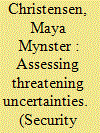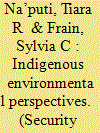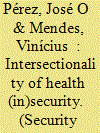|
|
|
Sort Order |
|
|
|
Items / Page
|
|
|
|
|
|
|
| Srl | Item |
| 1 |
ID:
189909


|
|
|
|
|
| Summary/Abstract |
The preemptive turn in counterterrorism has turned future uncertainties into key objects of contemporary security governance. From an empirically grounded perspective, this article contributes with novel insight into the everyday practices of preemptive politics. Focusing on Ghana as a unique case through which to trace how the mobilization of affect accelerates the transnational proliferation of counterterrorism measures and the commodification of future uncertainty, it shows how the global War on Terror has shaped the emergence of counterterrorism in a context characterized by the absence of terrorist attacks on home soil. Exploring how preemption animates outreach activities, simulation exercises, and nighttime patrols, it shows how police officers attempt to make uncertain futures tangible and actionable through practices of imagination and performance. Aimed at assessing terrorist threats that have not (yet) materialized, the article argues that preemptive policing practices cause a conflation of ordinary crime and extraordinary terror that inflates already existing uncertainties and subverts the institutional security logics of preemption.
|
|
|
|
|
|
|
|
|
|
|
|
|
|
|
|
| 2 |
ID:
189908


|
|
|
|
|
| Summary/Abstract |
This article centers Indigenous epistemologies to critique the United States oceanic security state, a modality of militarization and blue-washing conservation that extends beyond land borders to encompass federal conceptualizations of national security throughout the Pacific Ocean. Beginning with Indigenous perspectives from Oceania, it provides examples of Indigenous peoples’ continuing connections to ocean spaces and challenges to United States colonial geographic imaginaries and militarized destruction. Then, advancing the concept of the oceanic security state, it examines how United States assertions of sovereignty over Oceania are used to justify hyper-militarization while simultaneously destroying the environment and contributing to the climate crisis. These phenomena occur while the USA remains exempt from federal environmental conservation laws through ‘blue-washing’, and the United States government benefits from the exclusion of military emission data within international climate targets. The findings reveal how militarizing all ocean space in the name of United States national security operates within delineated borders of Exclusive Economic Zones, Marine National Monuments, and Marine Protected Areas. Guided by Indigenous epistemologies, the article concludes with alternative ways of understanding ocean spaces and constructing futures of genuine security.
|
|
|
|
|
|
|
|
|
|
|
|
|
|
|
|
| 3 |
ID:
189910


|
|
|
|
|
| Summary/Abstract |
Brazil has suffered severe consequences from the Covid-19 pandemic, currently ranking second globally in terms of total fatalities, with more than 682,000 lives lost. This article critically outlines how a ‘health security’ framework overlooks processes of intersectionality and the varying impacts of the virus on different segments of society, or what we term health insecurity. We organize our analysis around three aspects of the pandemic that have become salient in Brazilian society, namely access to healthcare, disposable workers, and exposure to the virus, and delineate the intersectional impact of gendered inequality, neoliberal ideologies, and racial hierarchies within these three themes. Our methodology employs media and scholarly interpretations of Covid-19, and other secondary empirical and statistical data, to outline the virus’s impacts on differently positioned bodies throughout Brazilian society. Our main findings reveal that during the pandemic, women’s labor and health concerns have been undervalued, exploitative working conditions have been exacerbated, and Afro-Brazilians have been put in situations of higher exposure to the virus in both public and private spaces. This article underscores the need to better examine how public health, systems of oppression and exclusion, and (in)security overlap with each other.
|
|
|
|
|
|
|
|
|
|
|
|
|
|
|
|
| 4 |
ID:
189911


|
|
|
|
|
| Summary/Abstract |
This article explores how disruptive political conflicts evolve in peace processes by studying Colombian human rights defenders’ discourses about the peace process with the FARC-EP. While post-conflict scholarship has predominantly discussed violence and societal frictions as caused by legacies of war or flawed peace governance, I focus on the confrontations over political imaginaries that are endemic to peace processes. Through the lens of post-foundational discourse theory, I read the peace process as hegemonic crisis. This allows me to unpack the entanglement of political change and conflict, to which my discussions with human rights defenders allude: On the one hand, the peace agreement opened a political moment, in which it seemed possible to leave behind the hitherto hegemonic imaginary of the conflict as terrorism that had protracted the ‘state of war’; the advocacy for peace with social justice, on the other hand, it restaged historical confrontations with elites of the political right as antagonistic conflict over the meaning of peace. My analysis not only challenges the paradigm of war-to-peace transition, but also defines discursive conditions under which disruptive conflicts turn a peace process into an enduring interregnum, where the dawn of the post-conflict epoch is perpetually deferred and activist lives are threatened.
|
|
|
|
|
|
|
|
|
|
|
|
|
|
|
|
| 5 |
ID:
189912


|
|
|
|
|
| Summary/Abstract |
This article analyses the organization of Chinese grassroots social management during the COVID-19 pandemic. Drawing on a range of local cases researched through policy documents, media coverage and interviews, we scrutinize the appropriation of emergency measures and the utilization of grid-style social management since the outbreak of COVID-19. Grid-style social management – a new grassroots administrative division aiming to mobilize neighbourhood control and services – is a core element in China’s pursuit of economic growth without sacrificing political stability. Conceptualizing grids as confined spaces of power, we show how the Chinese party-state is able to flexibly redeploy diverse forms of power depending on the particular purpose of social management. During non-crisis times, grid-style social management primarily uses security power, casting a net over the population that remains open for population elements to contribute their share to the national economy. Once a crisis has been called, sovereign power swiftly closes the net to prevent further circulation while disciplinary power works towards a speedy return to a pre-crisis routine.
|
|
|
|
|
|
|
|
|
|
|
|
|
|
|
|
|
|
|
|
|